新概念英语第二册Lesson 3 Please send me a card! (共38张PPT)
文档属性
| 名称 | 新概念英语第二册Lesson 3 Please send me a card! (共38张PPT) |
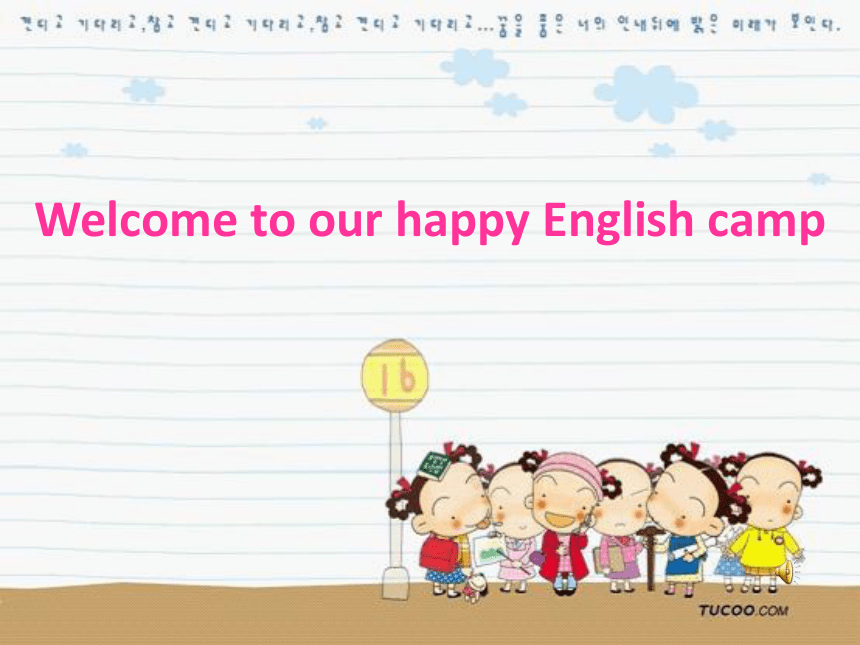
|
|
| 格式 | ppt | ||
| 文件大小 | 1.2MB | ||
| 资源类型 | 教案 | ||
| 版本资源 | 新概念英语 | ||
| 科目 | 英语 | ||
| 更新时间 | 2023-10-06 00:00:00 | ||
图片预览

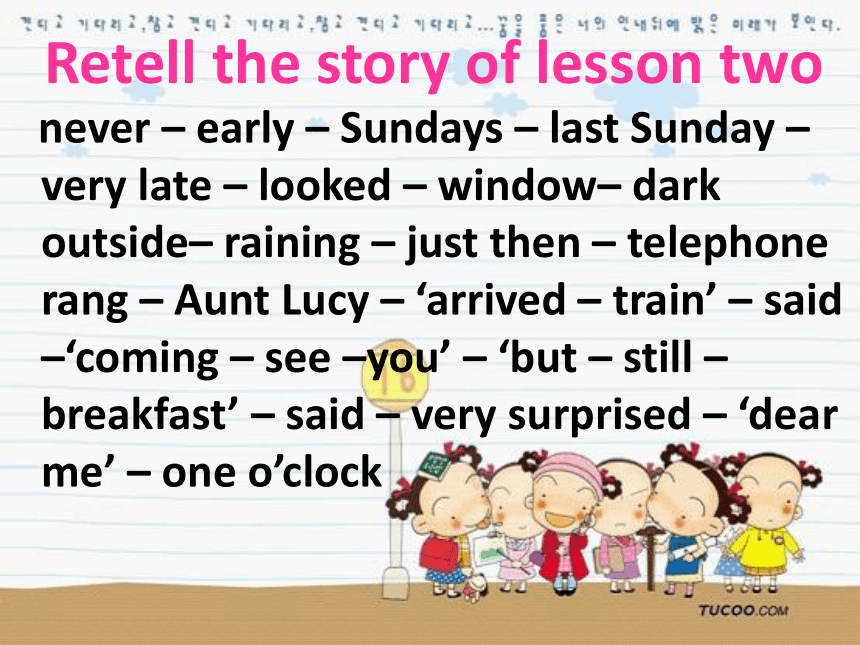
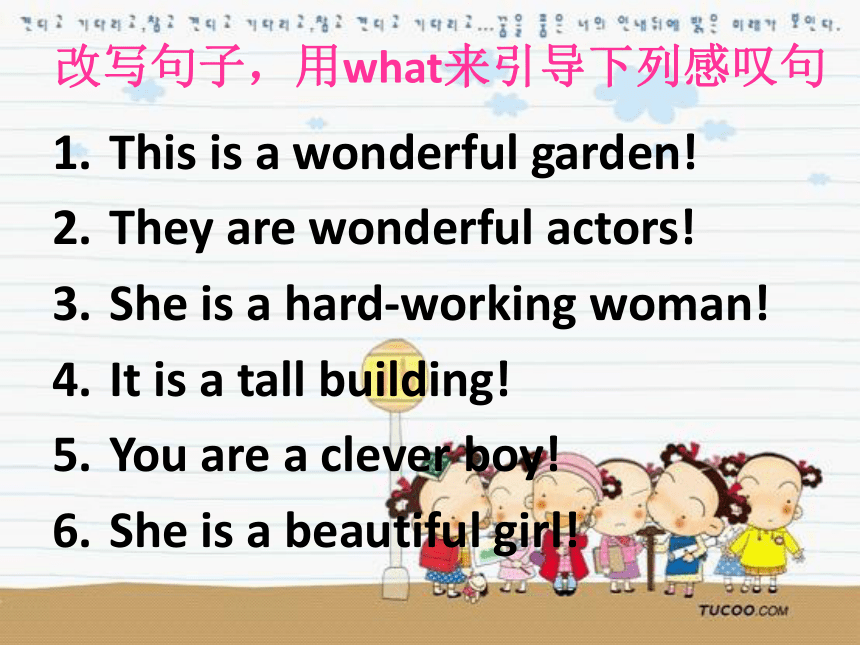
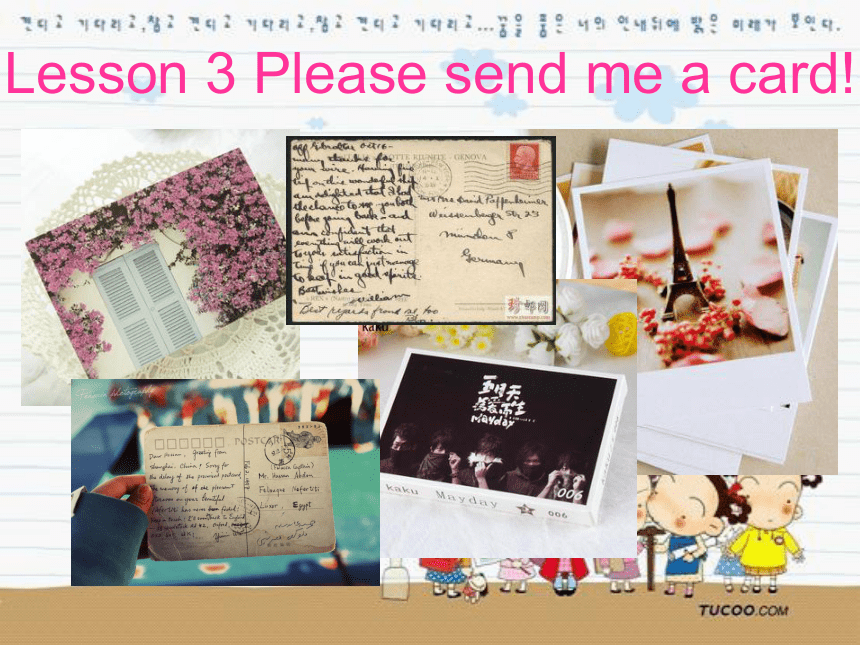
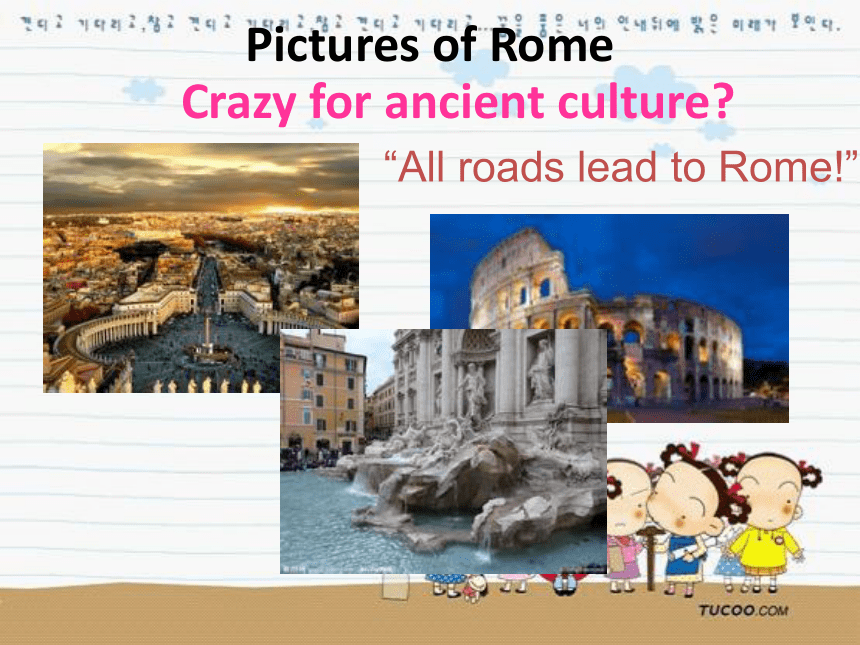
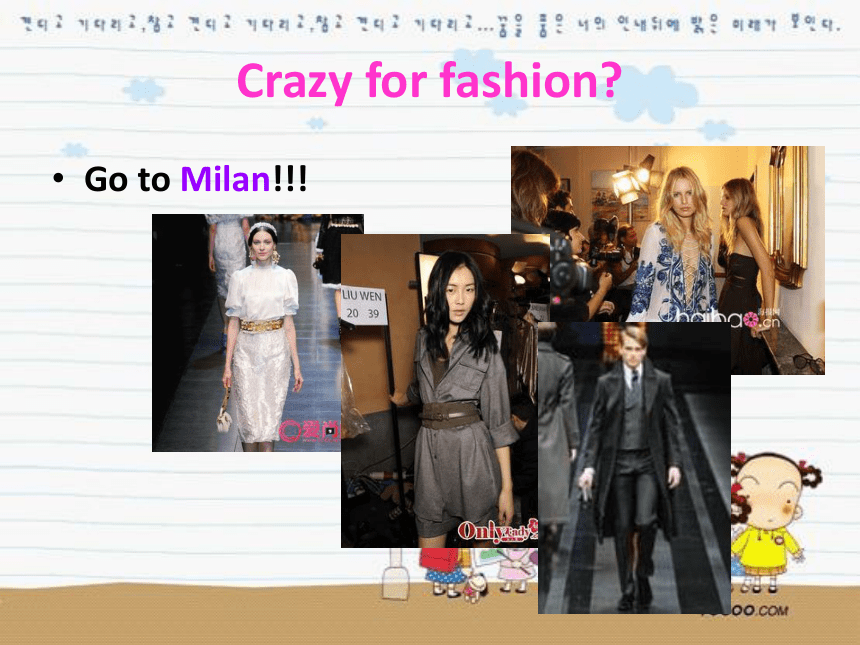
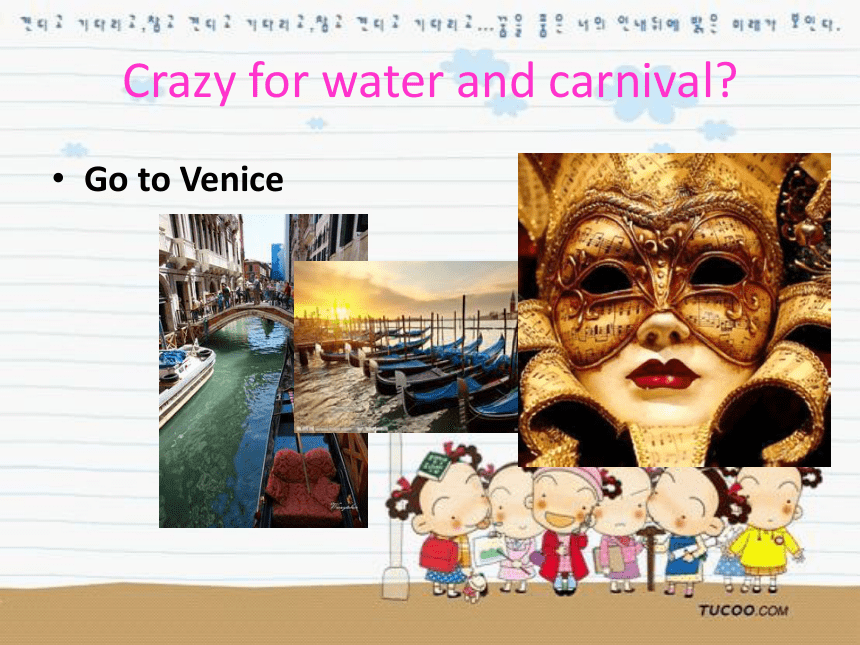
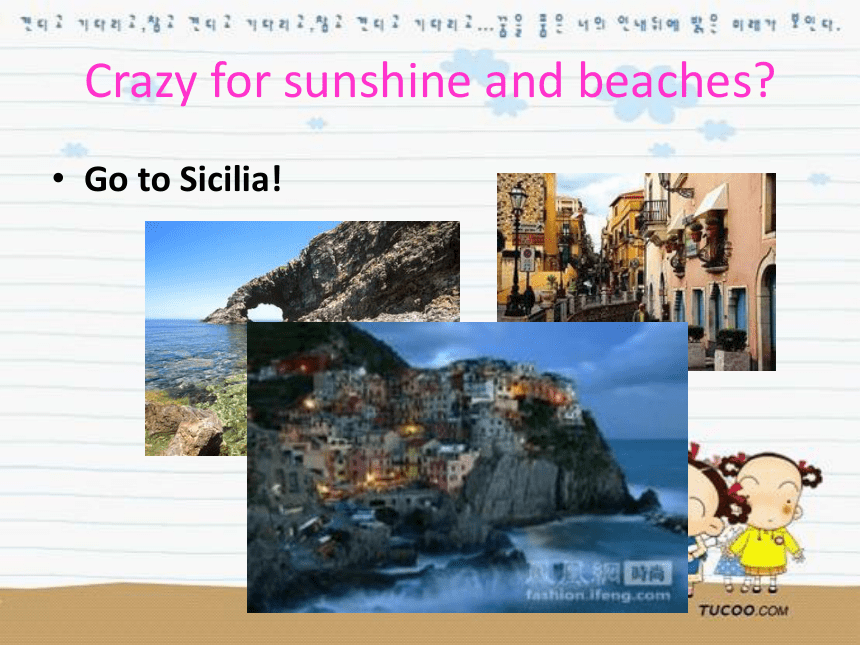
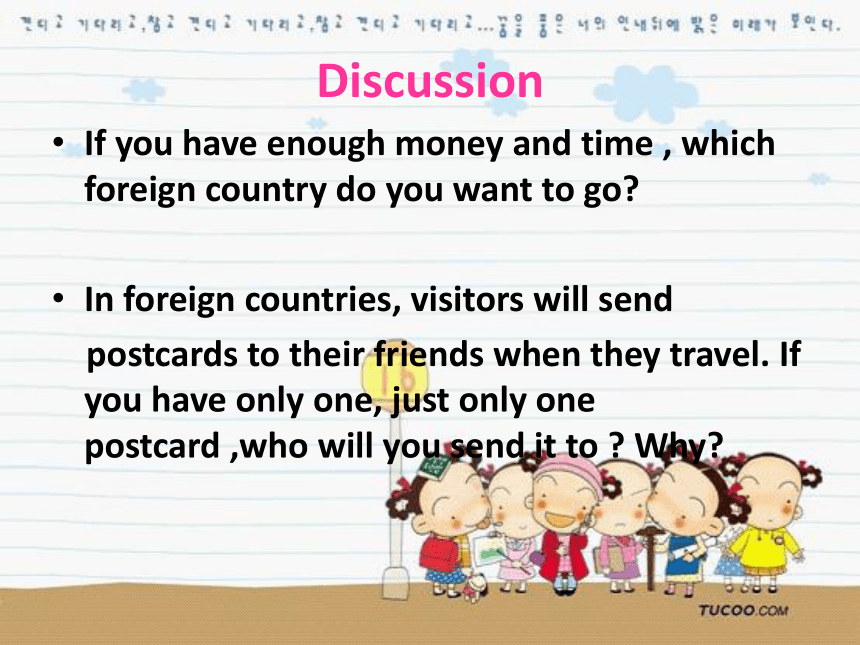
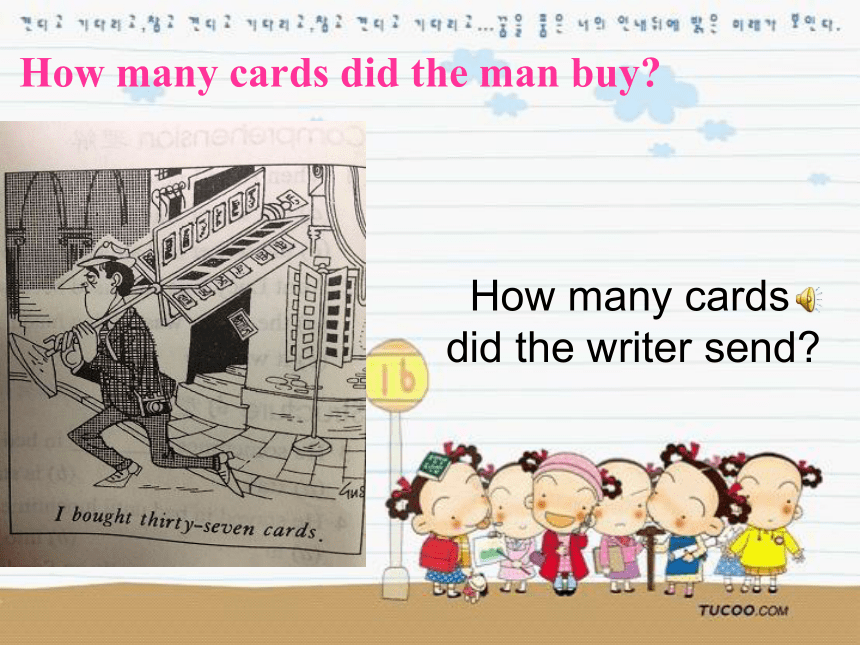
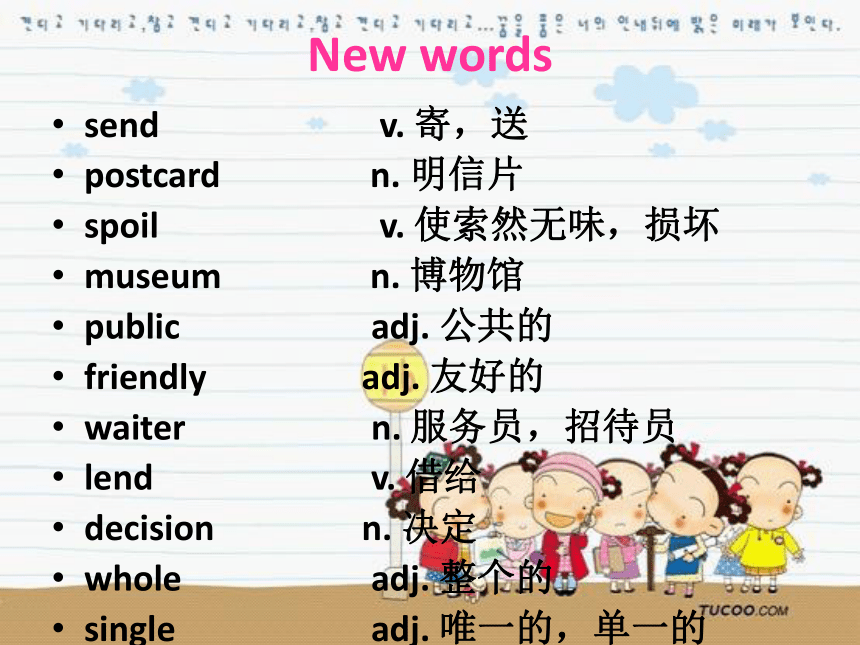
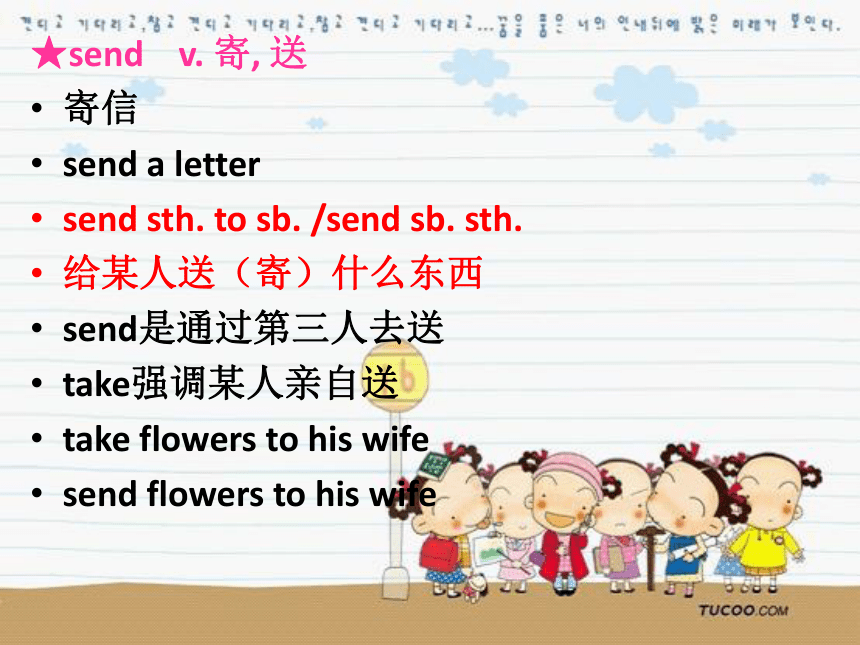
文档简介
(共38张PPT)
Welcome to our happy English camp
Retell the story of lesson two
never – early – Sundays – last Sunday – very late – looked – window– dark outside– raining – just then – telephone rang – Aunt Lucy – ‘arrived – train’ – said –‘coming – see –you’ – ‘but – still – breakfast’ – said – very surprised – ‘dear me’ – one o’clock
改写句子,用what来引导下列感叹句
This is a wonderful garden!
They are wonderful actors!
She is a hard-working woman!
It is a tall building!
You are a clever boy!
She is a beautiful girl!
Lesson 3 Please send me a card!
Pictures of Rome
“All roads lead to Rome!”
Crazy for ancient culture
Crazy for fashion
Go to Milan!!!
Crazy for water and carnival
Go to Venice
Crazy for sunshine and beaches
Go to Sicilia!
Discussion
If you have enough money and time , which foreign country do you want to go
In foreign countries, visitors will send
postcards to their friends when they travel. If you have only one, just only one postcard ,who will you send it to Why
How many cards did the man buy
How many cards did the writer send
New words
send v. 寄,送
postcard n. 明信片
spoil v. 使索然无味,损坏
museum n. 博物馆
public adj. 公共的
friendly adj. 友好的
waiter n. 服务员,招待员
lend v. 借给
decision n. 决定
whole adj. 整个的
single adj. 唯一的,单一的
★send v. 寄, 送
寄信
send a letter
send sth. to sb. /send sb. sth.
给某人送(寄)什么东西
send是通过第三人去送
take强调某人亲自送
take flowers to his wife
send flowers to his wife
★postcard n. 明信片
name card /visiting card 名片
这是我的名片
Here is my name card.
(口语常用, 同时伴随着递出的动作)
ID card 身份证
credit card 信用卡
cash card 现金卡, 储蓄卡, 工资卡(不能透支的那种)
★spoil(spoiled,spoilt)
① vt. 弄坏,损坏,糟蹋
这不幸的消息使我们没能过好周末。
The sad news spoiled our weekend.
这场雨把学校运动会弄得一团糟。
The rain spoiled the school sports meeting.
② vt. 宠坏,惯坏,溺爱
不能太惯孩子。
Don’t spoil your children.
这个小男孩的父母很宠爱他。
His parents spoiled the boy.
★public adj. 公共的
① adj. 公共的,公众的,社会的
在这个镇里有个公共图书馆
There is a public library in this town.
② adj. 公开的,众人皆知的
他们的秘密会晤20年以后才被公开。
Their secret meeting was made public 20 years later.
in public 公开的;in private 私下里的
让我们私下谈谈
Let’s have a conversation in private.
③ n. 公众,群众,大众
博物馆在周日对公众开放。
The museum is open to the public on Sunday.
★friendly adj. 友好的
friendly是形容词,单独使用时一般做定语
She gave me a friendly greeting.
她友好的向我问好。
他对约翰不友好。
He is not very friendly to John.
in a friendly way作为状语表示这个人做什么事情很友好, 用短语
他总是友好的向我问好。
He always greets me in a friendly way.
★waiter n. 服务员, 招待员
waiter(男服务员), waitress(女服务员), 只出现在餐馆里
chief waiter 领班
我要见你们的领班。
I want to see the chief waiter.
★lend v. 借给 (借出)
lend sth. to sb/lend sb. sth.
你能把你的自行车借给我吗?
Can you lend me your bike
borrow (借进):
他昨天借了我的笔。
He borrowed my pen yesterday.
★decision n. 决定
make /take a decision作出决定
对我来说作出这个决定是很困难的。
It was not easy for me to make/take this decision.
你作出决定了吗?
Have you made/taken a decision
decide v. 决定
decide to do sth 决定做某事
你为什么决定要找一份新工作?
Why did you decide to look for a new job
★whole adj. 整个的
一整瓶牛奶
a whole bottle of milk
the whole…
整天
the whole day
整整两星期
two whole weeks
Please send me a card
Postcards always spoil my holidays. Last summer, I went to Italy. I visited museums and sat in public gardens. A friendly waiter taught me a few words of Italian. Then he lent me a book. I read a few lines, but I did not understand a word. Everyday I thought about postcards. My holidays passed quickly, but I did not send cards to my friends. On the last day I made a big decision. I got up early and bought thirty-seven cards. I spent the whole day in my room, but I did not write a single card!
Comprehensive questions
Do postcards always spoil the writer’s holiday or not
Where did he spend his holidays last summer
What did he think about everyday
Did he send any cards to his friends or not
What is the writer’s big decision
Where did he stay all day
Did he write any cards or not
Postcards always spoil my holidays. Last summer, I went to Italy.
last:
① adj. 上一个
last summer里的last表示 “上一个”
上周日你干什么了?
What did you do last Sunday
② adj. 最后一个,表示“最后一个”时要加冠词the
the last day 最后一天
我们坐最后一班公交车回的家。
We caught the last bus home.
I visited museums and sat in public gardens.
A friendly waiter taught me a few words of Italian.
teach sb. sth. 教某人某事
王老师上学期教我们语文
Miss wang taught us chinese last term.
teach sb to do sth 教某人做某事
他教导孩子们不要打架
He taught the children not to fight.
Then he lent me a book. I read a few lines, but I did not understand a word.
Everyday I thought about postcards.
think about/of 考虑, 思考
你觉得天气怎么样
What do you think of the weather today
think of还可指想到
你想到什么了?
What do you think of
think over 仔细考虑,反复思考
My holidays passed quickly, but I did not send cards to my friends.
Pass
1)经过
我们经过该镇而未停留
We passed the town without stopping.
2)<时间>经过,过去
自从他前往意大利, 已过了两年
Two years have passed since he left for Italy.
3)(用手) 递<东西>; 传递 < (餐桌上的) 食物等>
请你把盐递给我好吗
Will you pass me the salt .
On the last day I made a big decision. I got up early and bought thirty-seven cards.
I spent the whole day in my room, but I did not write a single card!
spend与表示时间的词或短语连和时,意思为“花(时间)”、“度过”
spend+时间+地点 : 在什么地点我花费/度过了多少时间
我每天要在教室里呆3个小时
I spend three hours in the classroom everyday.
spend还可以表示“花钱”
他花很多钱用于买书
He spends a lot of money on books.
Multiple choice questions
Comprehension
1. The writer ______ .
a. doesn’t like buying postcards
b. doesn’t like receiving postcards
c. doesn’t like writing postcards
d. doesn’t like postcards
2. What was the writer’s ‘big decision’
a. He decided to write postcards to his friends.
b. He decided to spend the whole day in his room.
c. He decided to buy a lot of postcards.
d. He decided not to write a single card.
structure
3. Last summer he went to Italy. He was ______ Italy last summer.
a. at b. to c. in d. on
4. ______ him a few words of Italian The waiter.
a. Who taught b. Who did teach
c. What did he teach d. Whom did he teach
5. He was a friendly waiter. He spoke to the writer ______ .
a. friend b. as friends
c. like friends d. in a friendly way
6. The writer ______ a few lines, but he didn’t understand a word.
a. reads b. read c. red d. reading
7. He spent the whole day in his room. He was in his room _____ day.
a. the hole b. the all c. all d. all of
Vocabulary
8. A waiter usually works in a ______ .
a. public garden b. shop
c. restaurant d. private house
9. The waiter lent him a book. He ______ a book from the waiter.
a. lent b. borrowed c. took d. stole
10. On the last day he made a big decision. It was ______ day of his holiday.
a. final b. end c. latest d. bottom
11. He made a big decision. He ______ .
a. thought about it b. made up his mind
c. changed his mind d. made a wish
12. He didn’t write a single card. So he ______ .
a. wrote only one b. didn’t write ever one
c. wrote just one d. wrote all the cards except one
grammar
双宾语
He sent me a card
A friendly waiter taught me a few words of Italian.
He lent me a book
This little girl gave her mother a candy.
谓语动词后面接两个宾语。在以上的三个例子中,“me”是间接宾语,“a card”, “a few words of Italian” 和 “a book”为直接宾语。一般物是直接宾语,人是间接宾语。
双宾语
如果你想把直接宾语和间接宾语调换位置,那么change it like this.
He sent a card to me
A friendly waiter taught a few words of Italian to me.
He lent a book to me.
A man ordered me a bottle of beer = a man ordered a bottle of beer for me.
What is the difference between “to” and “for”?
可以翻译为 “给” 、 “替” 、 “为” 的, 就用for; 如果只能翻译为 “给” 的, 就用to
与for相连的 buy, order, make, find
find sth.for sb.
do sb.a favor 帮某人一个忙
Do me a favor please./Do a favor for me.帮我一个忙
Drills
Write each of the following sentences in a different way
He paid the shop keeper some money.
He sold all his books to me.
She showed her husband her new hat.
He gave his son some advice.
She is teaching English for us.
Bring me that book please.
Conclusion
给我送张明信片
Send me a card
让假日无趣
spoil one’s holidays
去意大利
go to Italy
在公园里坐坐
sit in public gardens
几句意大利语
a few words of Italian
借给我一本书
lend a book to me
读了几行
read a few lines
想着,考虑…
think about
作出重大的决定
make a big decision
花了一整天的时间
spend the whole day
过得很快
pass quickly
Retell the story with the following hints
6. Every day – thought – postcards
7. holidays – quickly – not – cards – friends
8. Last day – decision
9. Early – 37 cards
10. Whole day – room- not single card
1. Postcards- spoil – holidays
2. summer- Italy
3. museums- sat- gardens
4. Waiter – few – Italian
5. Lent – book, but - understand
Homework
Recite Lesson 3
Recite the words of lessons and have a dictation next time
Summary writing
Finish the exercises on the exercise book
Finish the exercises on page22
Thank you for listening
See you next time
Welcome to our happy English camp
Retell the story of lesson two
never – early – Sundays – last Sunday – very late – looked – window– dark outside– raining – just then – telephone rang – Aunt Lucy – ‘arrived – train’ – said –‘coming – see –you’ – ‘but – still – breakfast’ – said – very surprised – ‘dear me’ – one o’clock
改写句子,用what来引导下列感叹句
This is a wonderful garden!
They are wonderful actors!
She is a hard-working woman!
It is a tall building!
You are a clever boy!
She is a beautiful girl!
Lesson 3 Please send me a card!
Pictures of Rome
“All roads lead to Rome!”
Crazy for ancient culture
Crazy for fashion
Go to Milan!!!
Crazy for water and carnival
Go to Venice
Crazy for sunshine and beaches
Go to Sicilia!
Discussion
If you have enough money and time , which foreign country do you want to go
In foreign countries, visitors will send
postcards to their friends when they travel. If you have only one, just only one postcard ,who will you send it to Why
How many cards did the man buy
How many cards did the writer send
New words
send v. 寄,送
postcard n. 明信片
spoil v. 使索然无味,损坏
museum n. 博物馆
public adj. 公共的
friendly adj. 友好的
waiter n. 服务员,招待员
lend v. 借给
decision n. 决定
whole adj. 整个的
single adj. 唯一的,单一的
★send v. 寄, 送
寄信
send a letter
send sth. to sb. /send sb. sth.
给某人送(寄)什么东西
send是通过第三人去送
take强调某人亲自送
take flowers to his wife
send flowers to his wife
★postcard n. 明信片
name card /visiting card 名片
这是我的名片
Here is my name card.
(口语常用, 同时伴随着递出的动作)
ID card 身份证
credit card 信用卡
cash card 现金卡, 储蓄卡, 工资卡(不能透支的那种)
★spoil(spoiled,spoilt)
① vt. 弄坏,损坏,糟蹋
这不幸的消息使我们没能过好周末。
The sad news spoiled our weekend.
这场雨把学校运动会弄得一团糟。
The rain spoiled the school sports meeting.
② vt. 宠坏,惯坏,溺爱
不能太惯孩子。
Don’t spoil your children.
这个小男孩的父母很宠爱他。
His parents spoiled the boy.
★public adj. 公共的
① adj. 公共的,公众的,社会的
在这个镇里有个公共图书馆
There is a public library in this town.
② adj. 公开的,众人皆知的
他们的秘密会晤20年以后才被公开。
Their secret meeting was made public 20 years later.
in public 公开的;in private 私下里的
让我们私下谈谈
Let’s have a conversation in private.
③ n. 公众,群众,大众
博物馆在周日对公众开放。
The museum is open to the public on Sunday.
★friendly adj. 友好的
friendly是形容词,单独使用时一般做定语
She gave me a friendly greeting.
她友好的向我问好。
他对约翰不友好。
He is not very friendly to John.
in a friendly way作为状语表示这个人做什么事情很友好, 用短语
他总是友好的向我问好。
He always greets me in a friendly way.
★waiter n. 服务员, 招待员
waiter(男服务员), waitress(女服务员), 只出现在餐馆里
chief waiter 领班
我要见你们的领班。
I want to see the chief waiter.
★lend v. 借给 (借出)
lend sth. to sb/lend sb. sth.
你能把你的自行车借给我吗?
Can you lend me your bike
borrow (借进):
他昨天借了我的笔。
He borrowed my pen yesterday.
★decision n. 决定
make /take a decision作出决定
对我来说作出这个决定是很困难的。
It was not easy for me to make/take this decision.
你作出决定了吗?
Have you made/taken a decision
decide v. 决定
decide to do sth 决定做某事
你为什么决定要找一份新工作?
Why did you decide to look for a new job
★whole adj. 整个的
一整瓶牛奶
a whole bottle of milk
the whole…
整天
the whole day
整整两星期
two whole weeks
Please send me a card
Postcards always spoil my holidays. Last summer, I went to Italy. I visited museums and sat in public gardens. A friendly waiter taught me a few words of Italian. Then he lent me a book. I read a few lines, but I did not understand a word. Everyday I thought about postcards. My holidays passed quickly, but I did not send cards to my friends. On the last day I made a big decision. I got up early and bought thirty-seven cards. I spent the whole day in my room, but I did not write a single card!
Comprehensive questions
Do postcards always spoil the writer’s holiday or not
Where did he spend his holidays last summer
What did he think about everyday
Did he send any cards to his friends or not
What is the writer’s big decision
Where did he stay all day
Did he write any cards or not
Postcards always spoil my holidays. Last summer, I went to Italy.
last:
① adj. 上一个
last summer里的last表示 “上一个”
上周日你干什么了?
What did you do last Sunday
② adj. 最后一个,表示“最后一个”时要加冠词the
the last day 最后一天
我们坐最后一班公交车回的家。
We caught the last bus home.
I visited museums and sat in public gardens.
A friendly waiter taught me a few words of Italian.
teach sb. sth. 教某人某事
王老师上学期教我们语文
Miss wang taught us chinese last term.
teach sb to do sth 教某人做某事
他教导孩子们不要打架
He taught the children not to fight.
Then he lent me a book. I read a few lines, but I did not understand a word.
Everyday I thought about postcards.
think about/of 考虑, 思考
你觉得天气怎么样
What do you think of the weather today
think of还可指想到
你想到什么了?
What do you think of
think over 仔细考虑,反复思考
My holidays passed quickly, but I did not send cards to my friends.
Pass
1)经过
我们经过该镇而未停留
We passed the town without stopping.
2)<时间>经过,过去
自从他前往意大利, 已过了两年
Two years have passed since he left for Italy.
3)(用手) 递<东西>; 传递 < (餐桌上的) 食物等>
请你把盐递给我好吗
Will you pass me the salt .
On the last day I made a big decision. I got up early and bought thirty-seven cards.
I spent the whole day in my room, but I did not write a single card!
spend与表示时间的词或短语连和时,意思为“花(时间)”、“度过”
spend+时间+地点 : 在什么地点我花费/度过了多少时间
我每天要在教室里呆3个小时
I spend three hours in the classroom everyday.
spend还可以表示“花钱”
他花很多钱用于买书
He spends a lot of money on books.
Multiple choice questions
Comprehension
1. The writer ______ .
a. doesn’t like buying postcards
b. doesn’t like receiving postcards
c. doesn’t like writing postcards
d. doesn’t like postcards
2. What was the writer’s ‘big decision’
a. He decided to write postcards to his friends.
b. He decided to spend the whole day in his room.
c. He decided to buy a lot of postcards.
d. He decided not to write a single card.
structure
3. Last summer he went to Italy. He was ______ Italy last summer.
a. at b. to c. in d. on
4. ______ him a few words of Italian The waiter.
a. Who taught b. Who did teach
c. What did he teach d. Whom did he teach
5. He was a friendly waiter. He spoke to the writer ______ .
a. friend b. as friends
c. like friends d. in a friendly way
6. The writer ______ a few lines, but he didn’t understand a word.
a. reads b. read c. red d. reading
7. He spent the whole day in his room. He was in his room _____ day.
a. the hole b. the all c. all d. all of
Vocabulary
8. A waiter usually works in a ______ .
a. public garden b. shop
c. restaurant d. private house
9. The waiter lent him a book. He ______ a book from the waiter.
a. lent b. borrowed c. took d. stole
10. On the last day he made a big decision. It was ______ day of his holiday.
a. final b. end c. latest d. bottom
11. He made a big decision. He ______ .
a. thought about it b. made up his mind
c. changed his mind d. made a wish
12. He didn’t write a single card. So he ______ .
a. wrote only one b. didn’t write ever one
c. wrote just one d. wrote all the cards except one
grammar
双宾语
He sent me a card
A friendly waiter taught me a few words of Italian.
He lent me a book
This little girl gave her mother a candy.
谓语动词后面接两个宾语。在以上的三个例子中,“me”是间接宾语,“a card”, “a few words of Italian” 和 “a book”为直接宾语。一般物是直接宾语,人是间接宾语。
双宾语
如果你想把直接宾语和间接宾语调换位置,那么change it like this.
He sent a card to me
A friendly waiter taught a few words of Italian to me.
He lent a book to me.
A man ordered me a bottle of beer = a man ordered a bottle of beer for me.
What is the difference between “to” and “for”?
可以翻译为 “给” 、 “替” 、 “为” 的, 就用for; 如果只能翻译为 “给” 的, 就用to
与for相连的 buy, order, make, find
find sth.for sb.
do sb.a favor 帮某人一个忙
Do me a favor please./Do a favor for me.帮我一个忙
Drills
Write each of the following sentences in a different way
He paid the shop keeper some money.
He sold all his books to me.
She showed her husband her new hat.
He gave his son some advice.
She is teaching English for us.
Bring me that book please.
Conclusion
给我送张明信片
Send me a card
让假日无趣
spoil one’s holidays
去意大利
go to Italy
在公园里坐坐
sit in public gardens
几句意大利语
a few words of Italian
借给我一本书
lend a book to me
读了几行
read a few lines
想着,考虑…
think about
作出重大的决定
make a big decision
花了一整天的时间
spend the whole day
过得很快
pass quickly
Retell the story with the following hints
6. Every day – thought – postcards
7. holidays – quickly – not – cards – friends
8. Last day – decision
9. Early – 37 cards
10. Whole day – room- not single card
1. Postcards- spoil – holidays
2. summer- Italy
3. museums- sat- gardens
4. Waiter – few – Italian
5. Lent – book, but - understand
Homework
Recite Lesson 3
Recite the words of lessons and have a dictation next time
Summary writing
Finish the exercises on the exercise book
Finish the exercises on page22
Thank you for listening
See you next time
同课章节目录
